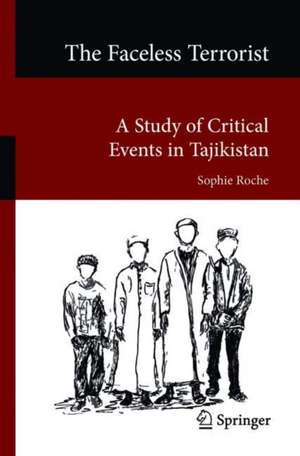The Faceless Terrorist: A Study of Critical Events in Tajikistan: Transcultural Research – Heidelberg Studies on Asia and Europe in a Global Context
Autor Sophie Rocheen Limba Engleză Paperback – 13 iun 2019
The book presents novel material on a fascinating and highly important topic, the nature of ostensibly Islamist political violence against the state in Tajikistan.
John Heathershaw
Din seria Transcultural Research – Heidelberg Studies on Asia and Europe in a Global Context
- 18%
 Preț: 948.92 lei
Preț: 948.92 lei - 18%
 Preț: 1216.48 lei
Preț: 1216.48 lei - 15%
 Preț: 637.59 lei
Preț: 637.59 lei - 15%
 Preț: 636.80 lei
Preț: 636.80 lei - 18%
 Preț: 939.46 lei
Preț: 939.46 lei - 15%
 Preț: 648.24 lei
Preț: 648.24 lei - 15%
 Preț: 639.25 lei
Preț: 639.25 lei - 15%
 Preț: 643.34 lei
Preț: 643.34 lei - 15%
 Preț: 640.55 lei
Preț: 640.55 lei - 18%
 Preț: 889.75 lei
Preț: 889.75 lei - 15%
 Preț: 649.54 lei
Preț: 649.54 lei -
 Preț: 419.06 lei
Preț: 419.06 lei - 15%
 Preț: 632.52 lei
Preț: 632.52 lei -
 Preț: 386.99 lei
Preț: 386.99 lei - 15%
 Preț: 636.30 lei
Preț: 636.30 lei -
 Preț: 387.75 lei
Preț: 387.75 lei -
 Preț: 363.52 lei
Preț: 363.52 lei - 18%
 Preț: 784.61 lei
Preț: 784.61 lei - 15%
 Preț: 644.18 lei
Preț: 644.18 lei - 18%
 Preț: 897.14 lei
Preț: 897.14 lei - 18%
 Preț: 779.57 lei
Preț: 779.57 lei - 15%
 Preț: 584.10 lei
Preț: 584.10 lei
Preț: 588.37 lei
Preț vechi: 692.19 lei
-15% Nou
Puncte Express: 883
Preț estimativ în valută:
112.62€ • 122.37$ • 94.66£
112.62€ • 122.37$ • 94.66£
Carte tipărită la comandă
Livrare economică 21 aprilie-05 mai
Preluare comenzi: 021 569.72.76
Specificații
ISBN-13: 9783030038427
ISBN-10: 3030038424
Pagini: 340
Ilustrații: XIII, 371 p. 6 illus. in color.
Dimensiuni: 155 x 235 mm
Greutate: 0.54 kg
Ediția:1st ed. 2019
Editura: Springer International Publishing
Colecția Springer
Seria Transcultural Research – Heidelberg Studies on Asia and Europe in a Global Context
Locul publicării:Cham, Switzerland
ISBN-10: 3030038424
Pagini: 340
Ilustrații: XIII, 371 p. 6 illus. in color.
Dimensiuni: 155 x 235 mm
Greutate: 0.54 kg
Ediția:1st ed. 2019
Editura: Springer International Publishing
Colecția Springer
Seria Transcultural Research – Heidelberg Studies on Asia and Europe in a Global Context
Locul publicării:Cham, Switzerland
Cuprins
Chapter 1. Introduction.- Chapter 2. Ethnographers, Functionaries, Mullahs, and the Making of “Muslims”.- Chapter 3. Biographical Narratives of Muslim Activists.- Chapter 4. Islamizdat Literature on the Notions of Jihad, Shahid, Mujahid, and Death.- Chapter 5. A Conflict Goes Online.- Chapter 6. Critical Events.- Chapter 7. The Politics of Traditions.- Chapter 8. A Cousin, a Mujahid, a Terrorist.- Chapter 9. Relation as Operations of Experiences.
Notă biografică
Sophie Roche is a Research Associate at the Heidelberg Centre for Transcultural Studies of the University of Heidelberg. She worked at the Max Planck Institute for Social Anthropology in Germany and received her PhD from Martin-Luther University Halle-Wittenberg in 2010. She studied youth as a socio-demographic factor (youth bulge) in Tajikistan and then joined the Zentrum Moderner Orient in Berlin in 2010 doing a project on jihad in text and context.
She has authored several articles that contextualize Tajiks within theoretical debates such as conflict studies and transcultural studies, and worked on Islam in Europe and Russia, environmental disasters as well as Soviet ethnography. She has been awarded visiting scholarships by the Institute d’études de l’islam et des sociétés du monde musulman (IISMM) and by the Fondation Maison Science de l’Homme (FMSH), both in Paris.
She has authored several articles that contextualize Tajiks within theoretical debates such as conflict studies and transcultural studies, and worked on Islam in Europe and Russia, environmental disasters as well as Soviet ethnography. She has been awarded visiting scholarships by the Institute d’études de l’islam et des sociétés du monde musulman (IISMM) and by the Fondation Maison Science de l’Homme (FMSH), both in Paris.
Textul de pe ultima copertă
How could a person portrayed as a terrorist by the Tajik state also be seen as a mujahid fighter in Islam and be a cousin all at the same time? Is this just a matter of perspective and conceptualization? To believe in the protection of concepts to safeguard groups and individuals from the uncertain character of the world, is to deny the existence of chance and the contradictions in life. This book uses approaches from existential anthropology to enquire into the question of how concepts and experiences relate. The focus is on the way the notions jihad, mujahid and terrorism were used during a military intervention in Tajikistan in 2010. The book includes long-term ethnographic material, popular pamphlets on Islam and an internet analysis of the conflict, offering new insights into how concepts and experiences relate. Since the end of the Soviet Union, the people from the republic Tajikistan have struggled to find a place in the larger Muslim world, a painful process unfolding in relation to global events, discourses and politics. The primary readership for the book will come from academia and policy makers.
The book presents novel material on a fascinating and highly important topic, the nature of ostensibly Islamist political violence against the state in Tajikistan.
John Heathershaw
The book presents novel material on a fascinating and highly important topic, the nature of ostensibly Islamist political violence against the state in Tajikistan.
John Heathershaw
Caracteristici
First ethnographic book on jihad and terrorism in Central Asia Engages with the contradictions in the debate over terrorism Gathers unique empirical material
